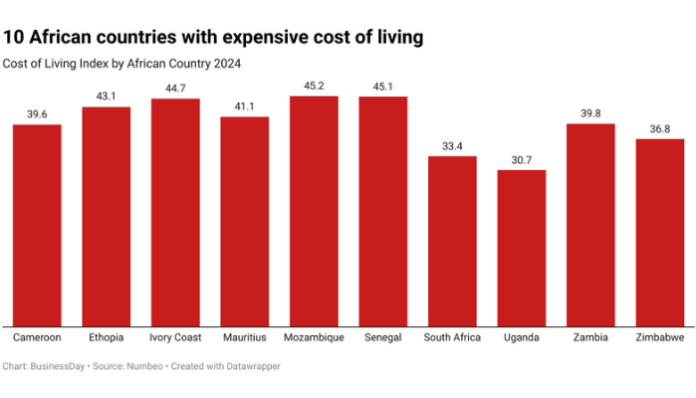The Cost of Living Index (excluding rent) serves as a measure of the relative prices of essential consumer goods, encompassing groceries, dining, transportation, and utilities within a given location. This index provides an estimate of the overall affordability of everyday items, excluding accommodation expenses like rent or mortgage.
For example, a city with a Cost of Living Index of 120 is considered to be approximately 20% more expensive than New York City, excluding housing costs. This metric allows for a comprehensive evaluation of the economic landscape, offering insights into the comparative expenses associated with daily essentials in different regions while isolating the impact of accommodation costs.
BusinessDay reported, that Inflation in Africa remains high, driven by agricultural supply shocks and imported inflation due to weakened local currencies and elevated commodity prices. This contrasts with global improvements, highlighting challenges in monetary policy transmission and structural weaknesses across the continent stated by the African Development Bank (AfDB), and further emphasizes the divergent inflation trends between Africa and advanced economies.
According to Numbeo, Here are ten countries with an expensive cost of living in 2024.
Mozambique – Cost of Living Index: 45.2, Global Rank: 63rd
Mozambique takes the lead as the African country with the highest cost of living in 2024. With its rich natural resources, Mozambique faces challenges such as high inflation, economic instability, and the aftermath of natural disasters. These factors contribute to the increased cost of living for its residents.
Senegal – Cost of Living Index: 45.1, Global Rank: 65th
Senegal closely follows Mozambique in the rankings. While Senegal has made strides in economic development, the cost of living remains high due to factors such as urbanization, rising housing costs, and inflation. The government’s efforts to address these challenges are ongoing, but the impact on the cost of living persists.
Ivory Coast – Cost of Living Index: 44.7, Global Rank: 66th
Ivory Coast, a West African nation known for its cocoa production, faces economic challenges that contribute to its high cost of living. Despite its efforts to diversify the economy, external factors like global commodity prices and internal issues such as infrastructure gaps contribute to the country’s ranking.
Ethiopia – Cost of Living Index: 43.1, Global Rank: 72nd
Ethiopia, with its rapidly growing economy, still struggles with the challenge of a high cost of living. The country’s focus on industrialization and infrastructure development has led to increased urbanization and rising living expenses. Inflation and currency depreciation also play a role in the overall cost of living for Ethiopians.
Mauritius – Cost of Living Index: 41.1, Global Rank: 79th
Mauritius, often considered a haven for tourists, faces a comparatively high cost of living for its residents. The island nation’s reliance on imports, limited natural resources, and the impact of global economic fluctuations contribute to the elevated living expenses experienced by its population.
Zambia – Cost of Living Index: 39.8, Global Rank: 80th
Zambia, with its dependence on copper exports, faces economic challenges that impact the cost of living. Fluctuations in commodity prices, coupled with external debt burdens, contribute to the financial strain experienced by Zambians.
Cameroon – Cost of Living Index: 39.6, Global Rank: 81st
Cameroon, with significant agricultural and natural resources, still faces economic challenges that result in a high cost of living. Factors such as political instability, corruption, and insufficient infrastructure contribute to the financial strain on its residents.
Zimbabwe – Cost of Living Index: 36.8, Global Rank: 93rd
Zimbabwe, known for its tumultuous economic history, continues to tussle with inflation and economic instability. While efforts to stabilize the economy are ongoing, the cost of living remains high, impacting the daily lives of Zimbabweans.
South Africa – Cost of Living Index: 33.4, Global Rank: 104th
South Africa, a major economic player on the continent, faces challenges such as high unemployment and income inequality. Even though being ranked lower globally compared to other African countries on this list, the cost of living in South Africa remains a concern for many citizens.
Uganda – Cost of Living Index: 30.7, Global Rank: 114th
Uganda rounds off the list, indicating that even with a relatively lower cost of living compared to other countries on this list, economic challenges persist. Factors such as high inflation, political uncertainties, and limited infrastructure development contribute to the overall cost of living for Ugandans.
-businessday

Bally has truly fixed us!
It is no mean feat to double the cost of living compared to when he took over.
Unfortunately for us, cost of living will get a lot worse this year. Hakainde has no clue how to improve things. He is like a zombie wandering aimlessly, blaming PF for everything.
Quite an informative and objective Article but in my opinion it only tells half the story, what about the level of Disposal Incomes of the Citizens in these countries? If the majority of Citizens belong to the Category of “Boma iyangane po”, even the price of salt is perceived to expensive (high cost of living”
Expensive cost of living? Wondering what that means…